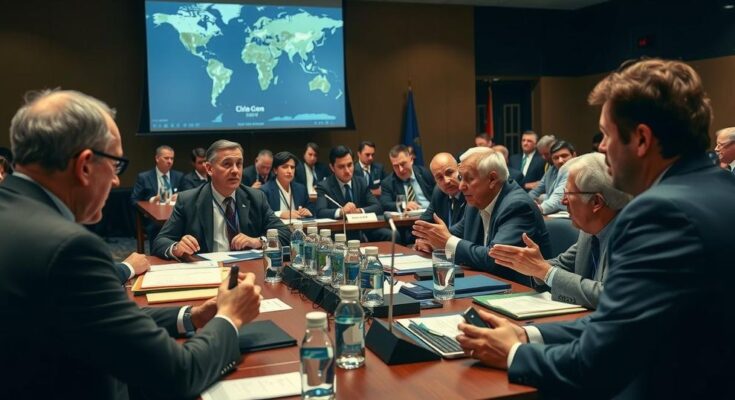The COP29 climate summit in Baku achieved a $300 billion climate finance agreement, criticized by many developing nations as inadequate. The negotiations revealed deep-seated frustrations over the willingness of developed countries to fulfill financial commitments, compounded by the looming return of climate skeptic Donald Trump. These developments raise concerns for future climate cooperation, particularly ahead of the upcoming COP30 in Brazil.
The COP29 climate summit in Baku concluded with President Mukhtar Babayev announcing a contentious $300 billion climate finance plan aimed at aiding developing nations over the next decade. Despite praise for the agreement, many stakeholders criticized it as insufficient, reflecting the increasingly strained climate cooperation landscape. As geopolitical tensions and the ascendance of isolationist policies overshadowed negotiations, the summit’s outcomes raised concerns regarding the future of international climate collaboration, particularly in light of a potential return of climate skeptic Donald Trump to the U.S. presidency. The dissatisfaction among developing nations highlights the growing divide and urgency for substantial reform in global climate negotiations, leading into the next major conference in Brazil.
Babayev’s dual-preparedness for the summit result hints at the anticipated difficulties surrounding climate negotiations amidst rising geopolitical risks. The agreement efforts were characterized by a lack of robust leadership from the United States, which is seen as pivotal, especially under the potential influence of former President Trump, whose skepticism toward climate policy poses a significant risk. The resistance from developing countries indicated broader discontent with the financial commitments of wealthier nations, asserting that they have been left behind in the negotiations designed to secure their livelihoods and enhance resilience against climate impacts.
The backdrop of COP29 highlights the critical junction at which global climate cooperation currently stands, exacerbated by the ongoing war in Ukraine and other conflicts diverting attention from climate issues. The reduced focus and funding for climate initiatives have led to calls for urgent reform to secure a more equitable financing system that addresses the needs of vulnerable nations. As the March for the upcoming COP30 approach, the failure to effectively address these concerns could further erode trust in the global climate framework, essential for combating climate change effectively on an international scale.
The Conference of the Parties (COP) is an annual event under the United Nations Framework Convention on Climate Change (UNFCCC) where nations come together to negotiate and advance global climate action. COP29, held in Baku, Azerbaijan, was marked by significant challenges, including geopolitical tensions, wavering U.S. commitment, and rising isolationism, which hampered negotiations and reduced expectations for meaningful agreements. The context of climate finance remains pivotal as developing nations seek support from developed countries to cope with the impact of climate change.
In conclusion, the COP29 climate summit underscored the challenges facing global climate cooperation as nations navigate geopolitical tensions and shifting political landscapes. The disappointment voiced by developing nations regarding financial commitments reflects a critical need for reform in climate negotiations. As the world looks to Brazil for COP30, the imperative to restore trust and ensure substantial support for vulnerable communities has never been more urgent.
Original Source: wmbdradio.com




